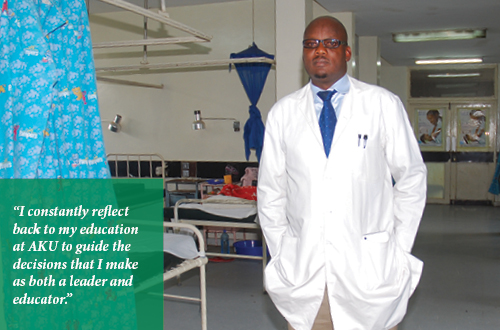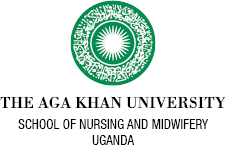George Agot Nyadimo
 George, the Nursing Services Manager at Pumwani Maternity Hospital, attended Kenya Medical Training College Kisumu for a Diploma in Health Nursing. When he graduated in 1997, he was posted by the Ministry of Health to the National Spinal Injury Hospital in Nairobi. Then he studied for a Diploma in Advanced Nursing at Kenyatta University and took classes in leadership, management, governance, hospital operations and other subjects in institutions in Kenya and South Korea. From 2012 to 2014, he studied for a Master of Science degree in Health Economics and Policy at the University of Nairobi while he worked at the Nairobi Remand Prison’s health centre, where he partnered with MaltesaInternational in renovating and constructing new buildings – one for the general public and one for the prisoners.
George, the Nursing Services Manager at Pumwani Maternity Hospital, attended Kenya Medical Training College Kisumu for a Diploma in Health Nursing. When he graduated in 1997, he was posted by the Ministry of Health to the National Spinal Injury Hospital in Nairobi. Then he studied for a Diploma in Advanced Nursing at Kenyatta University and took classes in leadership, management, governance, hospital operations and other subjects in institutions in Kenya and South Korea. From 2012 to 2014, he studied for a Master of Science degree in Health Economics and Policy at the University of Nairobi while he worked at the Nairobi Remand Prison’s health centre, where he partnered with MaltesaInternational in renovating and constructing new buildings – one for the general public and one for the prisoners.
He enrolled at AKU for a Bachelor of Science in Nursing (BScN) in 2007. In 2008 George was posted to Pumwani Maternity in the position of lecturer (nursing and midwifery). After seven years, in 2015, he was appointed to his current position. “When I took up this position, it was after the 2015 strike that had 60 nurses sacked. The ‘paralyzed environment’ and press stories dented the hospital’s image. My appointment was viewed as part of the management solution to the difficulties,”George explains.
George says he was well prepared by AKU for the task. “The first thing I did was study the environment and carry out a skills audit of the hospital, after which I reshuffled departmental managers, rotated nurses and changed the admission process in wards. I also focused on transforming the working environment by increasing inter-departmental communication and faculty feedback. The impact of the changes is reflected in the work output. Before I took over, deliveries per month were at 900. Now they are at 1,800, and newborn extended stays fell from 90 to 40. This is because now when mothers arrive, they are taken in immediately and assisted. This move has also reduced the neonatal mortality in the hospital. Maternal mortality has gone down from two per month to two in the past seven months.”
According to George, it was not easy because initially, nurses were suspicious about his motives – rotating nurses, coming in early and looking at all reports. But now the working environment has been transformed and the improvements recognized by the country government. “The AKU unit called ‘clinical practice’ prepared me to bring the public sector to a higher level,” George says.
Pumwani Maternity offers myriad services, including training and development (nurses), midwifery and obstetrics, maternal/child health and family planning. The Comprehensive Care Centres (for HIV and AIDS) handle counseling, testing, treatment and prevention of mother-to-baby transmission. An adolescent clinic offers reproductive health services and counseling on HIV and AIDS, and is staffed by young health workers. Pumwani Maternity’s main population is pregnant mothers from Kajiado, Kiambu, Naivasha and Nairobi, especially the mostly low income Eastlands area. There are 265 beds, 150 cots and two theatres. Nurses handle around 200 outpatients daily.
“My day starts at 6:00 a.m., when I start my rounds in the labour ward – the epicentre of the hospital,” George says. “I get reports, patients’ status and challenges. After discussions with nurses, I go to my office and address pending work. At 7:30 a.m. I look at night reports and catch up with my studies. I head to the labour ward at 8:00 a.m. and listen to handover reports and make decisions if there are problems. I work until 5:00 pm. I do some more private studies before I go home.”
During his final year at AKU, George took an elective unit in problem solving that had him seconded to Mbagathi Hospital. “It made me grow,” he says. “The 170 nurses and all the patients have different personalities and backgrounds and I have to work with them all.”
Married and with three children, George owes much to AKU, the only university in the region that offered a nursing degree in his time. Like other students with families to support, he could not afford to pay his fees with his meager earnings. AKU’s payment plan allowed him to pay in installments, giving him time to concentrate on academics.
At AKU, one of the things that stood out for George was the conducive learning environment. AKU lecturers, he says, were always available for face-toface consultations – including heads of departments – unlike in other learning institutions. Meeting nurses in a variety of jobs changed his mindset and motivated him because he realized he could advance his career.
His main challenge at the moment is human resources. The hospital’s 170 nurses are not enough for the busy facility. Three hundred would be a more realistic figure, he says.
Currently, when a nurse misses work, there is a crisis because someone has to do their work. Pumwani depends on funds from the county government, and George says the hospital needs more funds. Apart from his administration job at Pumwani, George is a researcher, author, consultant and part -time lecturer in health economics, health financing and maternal health at the Jaramogi Oginga Odinga University of Science and Technology in Kisumu. His personal goal is to complete his PhD on the Economic Evaluation of Health Care Programmes in the Region.
His goal for Pumwani Maternity is to take it to another level – to make it the maternity hospital of choice for all mothers, not just mothers from low -income areas. When George picked the nursing option after high school, fellow villagers could not understand how a man can study nursing, a predominantly female profession. His success has inspired young men in his community to take up nursing as a career and he has encouraged many Pumwani Maternity nurses to enroll at AKU. So far, four have done so. New nurses at Pumwani Maternity call him “role model.”


